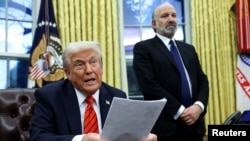President Donald Trump moved to substantially raise tariffs on steel and aluminum imports on Monday, canceling exemptions and duty-free quotas for major suppliers Canada, Mexico, Brazil and other countries in a move that could boost the risk of a multifront trade war.
Trump signed proclamations that raised the tariff rate on aluminum imports to 25% from the previous 10% that he imposed in 2018 to aid the struggling sector. His action reinstates a 25% tariff on millions of tons of steel imports and aluminum imports that had been entering the U.S. duty free under quota deals, exemptions and thousands of product exclusions.
The proclamations were extensions of Trump's 2018 Section 232 national security tariffs to protect steel and aluminum makers. A White House official said the exemptions had eroded the effectiveness of these measures.
Trump also will impose a new North American standard requiring steel imports to be "melted and poured" and aluminum to be "smelted and cast" in the region to curb imports of minimally processed Chinese steel into the U.S.
The order also targets downstream steel products that use imported steel for tariffs.
Trump's trade adviser Peter Navarro said the measures would help U.S. steel and aluminum producers and shore up America's economic and national security.
"The steel and aluminum tariffs 2.0 will put an end to foreign dumping, boost domestic production and secure our steel and aluminum industries as the backbone and pillar industries of America's economic and national security," he told reporters.
"This isn't just about trade. It's about ensuring that America never has to rely on foreign nations for critical industries like steel and aluminum."
Trump first broached the steel and aluminum action on Sunday, adding that he would also announce a further set of reciprocal tariffs later in the week, drawing warnings of retaliation from trade partners.
